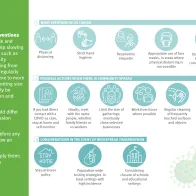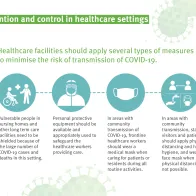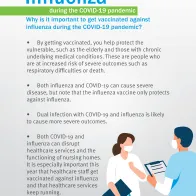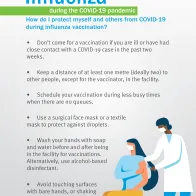Questions and answers on COVID-19: Medical information
1. What are the symptoms of COVID-19?
Symptoms of COVID-19 can vary in severity from none at all (asymptomatic) to:
- fever
- cough
- sore throat
- general weakness, fatigue and muscle pain
- loss of smell and taste.
The most severe cases can lead to shortness of breath due to pneumonia and acute respiratory distress syndrome, as well as other complications, potentially leading to death. Reports show that people with COVID-19 can get worse quickly, often during the second week of disease. Individuals who have difficulty breathing should contact their healthcare providers. Symptoms may also vary depending on the variant and whether one has been vaccinated or previously infected.
2. What is post-COVID-19 condition?
In some people with COVID-19, symptoms persist for weeks or even months after recovering from the acute illness. This is referred to as ‘post COVID-19 condition’, sometimes described as ‘long COVID’. Individuals whose symptoms persist for more than a few weeks after being diagnosed with COVID-19 should consult their healthcare providers.
Such persisting symptoms can include:
- respiratory symptoms (cough, shortness of breath)
- fatigue
- cognitive difficulties (‘brain fog’)
3. Are some people more at risk of COVID-19 than others?
Age accounts for most of the increase in risk of severe COVID-19. People 60 years of age and older, as well as those with underlying health conditions, are more at risk of developing severe symptoms. The health conditions that increase the risk of severe disease include:
- hypertension
- diabetes
- cardiovascular disease
- chronic respiratory disease
- pregnancy
- immune suppression.
Male patients in these groups appear to be at a slightly higher risk than female patients. Unvaccinated people are at higher risk for severe disease and death compared with vaccinated people, as the vaccine gives effective protection against severe disease and death.
4. What risks does SARS-CoV-2 infection pose to children and what is their potential role in transmission?
Children of all ages may become infected with and transmit SARS-CoV-2.
Children tend to have a much lower risk of developing symptoms associated with severe COVID-19 such as pneumonia and respiratory insufficiency.
Children can develop post COVID-19 condition, sometimes referred to as ‘long COVID’. This is when symptoms, such as fatigue, dizziness, headache and difficulties concentrating, persist for weeks or months or appear after the acute illness is over. The cause of the persistence of symptoms is unknown.
In rare instances, children may also develop multisystem inflammatory syndrome in children (MIS-C).
5. What is multisystem inflammatory syndrome in children (MIS-C)?
Multisystem inflammatory syndrome in children (MIS-C) is a rare condition. It causes inflammation in several body organs, such as the heart, lungs, kidneys, brain, skin, eyes or gastrointestinal system.
There is currently no specific test available to diagnose this syndrome, so diagnosis is based on clinical signs and symptoms, as well as evidence of a previous SARS-CoV-2 infection or exposure.
Children who develop MIS-C are generally previously healthy and the infection with SARS-CoV-2 is usually mild or asymptomatic. It is important to detect and treat MIS-C cases as soon as possible.
6. What is the risk of SARS-CoV-2 infection in pregnant women and newborn babies?
Available data indicate that pregnant women have a higher risk of severe disease compared with women who are not pregnant. SARS-CoV-2 infection also increases the risk of pregnancy complications such as preterm birth. Pregnant women who have diabetes and/or are obese may experience more severe disease.
Therefore, pregnant women are advised to get vaccinated, as antibodies might also protect the foetus. No pregnancy complications have been reported after vaccination.
It is not known whether SARS-CoV-2 can be transmitted to the foetus. A few COVID-19 cases in pregnant women and newborns have been reported, with good overall outcomes and no severe illness for newborns. Available evidence has not identified a high risk of complications in babies born to mothers with COVID-19.
General precautions for the prevention of COVID-19 for pregnant women include:
- physical distancing
- regular handwashing
- avoiding individuals who are sick
- self-isolating in the event of symptoms.
Pregnant women should consult their healthcare providers for advice.
7. Is there any treatment for COVID-19 disease?
Treatment for COVID-19 in patients with mild symptoms and no risk factors for severe disease only addresses the symptoms (e.g. drugs that reduce fever, fluids and rest).
Several pharmaceutical agents have been approved in Europe for the early treatment of COVID-19 in people with risk factors for severe disease and unfavourable outcomes. These include the orally available antiviral combination of nirmatrelvir and ritonavir, as well as monoclonal antibodies.
For people who are hospitalised with severe COVID-19, treatment options include:
- corticosteroids
- other immunomodulating agents such as tocilizumab, baricitinib and anakinra
- remdesivir, an antiviral agent
- supportive treatment (e.g. oxygen therapy, fluid supplementation, etc., as needed).
The use of antibiotics is discouraged, unless there is evidence of a bacterial infection, as they are not effective against SARS-CoV-2.
8. When and where should I be tested for COVID-19?
Two types of tests are used to detect SARS-CoV-2 infection:
- Polymerase chain reaction (PCR) tests, which are molecular tests that can detect the genetic material of the virus.
- Rapid antigen tests, which can detect certain viral proteins.
Rapid antigen tests are faster but less accurate than PCR tests. Both tests are usually done on samples collected from the throat or nose using a swab.
Testing strategies are adapted to the local epidemiological situation and public health goals. Testing people without symptoms to screen for COVID-19 can be offered in specific situations to decrease the risk of COVID-19 transmission, such as:
- in healthcare settings
- before travel
- at cultural events
- in the workplace
- in school settings.
A third type of testing called ‘serological testing’ is available to check for antibodies. This provides information on whether someone has been infected with the virus in the past. These tests are conducted using a blood sample to detect antibodies, which usually develop within a few weeks after the initial infection. Serological tests are predominantly used in scientific studies and are not considered proof of immunity.
Individuals should contact their local authorities to inquire about whether and where they should be tested.







